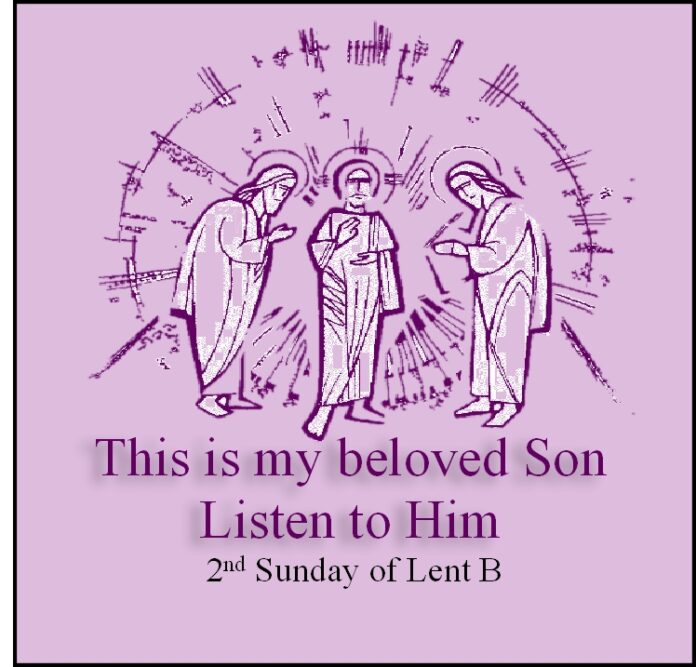Readings: Genesis 22:1-2,9-13,15-18; Romans 8:31-34; Mark 9:2-10
Theme: ‘The Love that dances in the heart of things’ (Malcolm Guite)
Today, we are invited to reflect on an extraordinary event in the life of Jesus, the moment he was transfigured in the presence of his disciples, Peter, James and John. The significance of this event is shown by the fact that it is described in detail in three of the gospels. According to the popular biblical scholar, Tom Wright, the transfiguration ‘shows that Jesus is the place where God’s world and ours meet… It forms part of a new set of signposts, Jesus-shaped signposts, indicating what is to come: a whole new creation, starting with Jesus himself as the seed that is sown in the earth and then rises to become the beginning of that new world’ (from his book, Simply Jesus, p. 144).
The story of the Transfiguration, as recounted in today’s gospel reading from Mark, takes place at a critical moment in the life of Jesus. Jesus has left behind his beloved Galilee and turned his face towards Jerusalem, where he knows he will meet the same fate as the prophets before him. He has already warned his disciples that the Son of man is destined ‘be rejected by the elders and the chief priests and the scribes, and be killed, and after three days rise again’ (Mk 8: 31). And he rebuked Peter for refusing to accept this prophesy: ‘Get behind me, Satan! Because the way you think is not God’s way but man’s’ (Mk 8:33).
Now, about to enter the final phase of his mission, he withdraws, as was his custom, to a mountain to pray and reflect, taking with him three of his disciples, Peter, James, and John. In their presence he is transfigured: ‘His clothes became dazzlingly white, whiter than any earthly bleacher could make them’ (Mk 9:3). At that moment he is re-affirmed in his identity and messianic vocation by his Father: ‘This is my Son, the Beloved. Listen to him’ (Mk 9:7). It was surely this affirmation that gave Jesus the strength to face the agony that lay ahead. His intense experience of the Father’s love confirmed the truth to which Paul attests in today’s second reading: ‘With God on our side, who can be against us’? (Romans 8:31).
The transfiguration experience was important not only for Jesus but also for his beloved disciples, Peter, James, and John. Their eyes were opened and they catch a glimpse of Jesus in his glory, and their ears were opened to hear the divine confirmation of Jesus’ identity as the ‘beloved Son’ to whom they are commanded to listen. Captivated by the experience, Peter wants to remain on the mountain in the exalted company of Elijah, Moses and Jesus. However, this is not to be. This luminous moment passes and the three disciples find themselves alone with Jesus who warns them not to tell anyone what they have witnessed ‘until the Son of Man had risen from the dead’ (Mk 9:9). We are told that the disciples observed his warning faithfully, but continued to reflect on what they had seen and heard, wondering what it all meant.
Today’s gospel prompts us to recall ‘transfiguration moments’ in our own lives, moments when we caught a glimpse of a transcendent beauty beyond the horizon of the habitual. Poets capture such moments better than we can. In his poem, ‘Primrose’, Patrick Kavanagh, recalls and reflects on a moment when, as a child sitting on a river bank, he found ‘One small page of Truth’s manuscript made clear’ and ‘looked at Christ transfigured without fear’. Seamus Heaney, in his poem ‘Postscript’, writes of a moment when, while driving along the magnificent west coast of county Clare, with the wild ocean on one side and the extraordinary expanse of the Burren on the other, ‘big soft buffetings come at the car sideways / And catch the heart off guard and blow it open’. Such moments may not change us as they are always fleeting. But they can burst open our hearts to a sustaining presence in our lives and help us cope with times of great fear and uncertainty – such as we are experiencing at present – uplift our spirits, and carry us forward in hope of a better future.
Lent is a time to recall such moments in our own lives and draw strength from them. It is a time to trust in the Lord, like Abraham in our first reading, even when the odds seem stacked against us. It is a time to withdraw to the mountain with Jesus, to listen to him, and allow him to lead us on our journey towards Easter. I will end with a beautiful poem by the Anglican poet, Malcolm Guite, entitled Transfiguration, which, for me, captures the eternal significance of that sublime event.
For that one moment, ‘in and out of time’,
On that one mountain where all moments meet,
The daily veil that covers the sublime
In darkling glass fell dazzled at his feet.
There were no angels full of eyes and wings
Just living glory full of truth and grace.
The Love that dances at the heart of things
Shone out upon us from a human face
And to that light the light in us leaped up,
We felt it quicken somewhere deep within,
A sudden blaze of long-extinguished hope
Trembled and tingled through the tender skin.
Nor can this blackened sky, this darkened scar
Eclipse that glimpse of how things really are
Fr Michael McCabe SMA
To listen to an alternative Homily for this Sunday, from Fr Tom Casey of the SMA Media Centre, Ndola, Zambia please click on the play button below.
|
|

